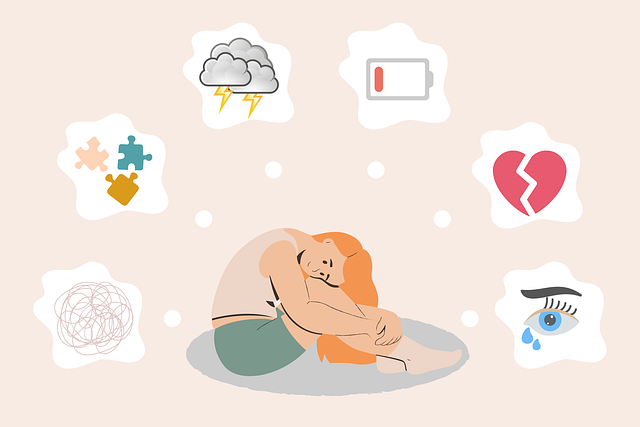Therapy focused on gender-affirming care for young adults uses the RFM (Resilience, Flexibility, Mastery) framework to build resilience and improve mental well-being. By integrating self-awareness exercises, stress reduction techniques, mindfulness meditation, and positive thinking, therapists empower individuals to cope with challenges, enhance self-esteem, prevent burnout, and foster personal growth. Case studies show significant improvements in stress management, mood regulation, and life satisfaction among transgender youth receiving this holistic approach.
Resilience is a vital asset for young adults navigating mental health challenges. This article explores how Resilient Factors Model (RFM) exercises, combined with gender-affirming care, can significantly enhance therapeutic outcomes. We delve into the impact of these approaches on building resilience, offering practical strategies for therapists integrating RFM into sessions. By examining case studies, we demonstrate the success of this method in supporting young adults’ mental well-being, particularly within the context of gender-affirming care.
- Understanding RFM and Its Relevance in Young Adult Mental Health
- The Impact of Gender-Affirming Care on Resilience Building
- Exercises to Foster Resilience in a Supportive Environment
- Integrating RFM into Therapy Sessions for Optimal Results
- Case Studies: Success Stories of RFM and Gender-Affirming Care
Understanding RFM and Its Relevance in Young Adult Mental Health

Understanding RFM, or Resilience, Flexibility, and Mastery, is essential when addressing the mental health needs of young adults. This framework recognizes that building resilience is a cornerstone in supporting this demographic through therapy for Young Adults. By focusing on these three key areas, professionals can provide gender-affirming care that empowers individuals to navigate challenges and foster positive thinking.
Resilience, a fundamental aspect of RFM, involves developing the ability to adapt and bounce back from adversity. Self-awareness exercises and stress reduction methods are powerful tools within this construct, enabling young adults to recognize their emotional responses and implement effective coping strategies. This proactive approach not only enhances overall well-being but also equips individuals with lifelong skills to overcome future obstacles.
The Impact of Gender-Affirming Care on Resilience Building

The provision of gender-affirming care has been recognized as a pivotal aspect of resilience building in young adults, particularly those navigating their identity and mental health challenges. This approach, often integral to therapy for young adults, emphasizes creating a supportive environment that aligns with an individual’s genuine gender expression. Such care fosters a sense of safety and belonging, serving as a robust foundation for resilience against societal pressures and internalized negative beliefs.
In the context of burnout prevention strategies for healthcare providers, promoting gender-affirming care can significantly contribute to better patient outcomes. Encouraging self-care routine development for better mental health within this framework enables young adults to cultivate inner strength. By validating their experiences and offering non-judgmental support, healthcare professionals facilitate a transformative journey where individuals build resilience, enhance self-esteem, and develop coping mechanisms that transcend traditional gender norms.
Exercises to Foster Resilience in a Supportive Environment

Building resilience is an essential aspect of personal growth, especially for young adults navigating their identity and place in the world. In a supportive environment, various exercises can help foster this mental strength and adaptability. Therapy for young adults often incorporates gender-affirming care, creating a safe space to explore emotions, thoughts, and experiences without judgment. This freedom allows individuals to engage in activities that challenge them and teach valuable coping strategies.
One such exercise is mindfulness meditation, which encourages individuals to stay present and aware of their feelings, thereby enhancing their ability to manage stress and anxiety effectively. Additionally, group therapy sessions can provide a platform for learning conflict resolution techniques, promoting healthy communication, and understanding different perspectives—all vital components in building resilience and preventing burnout. Positive thinking exercises, tailored to each individual’s needs, can also empower young adults to reframe challenges as opportunities for growth.
Integrating RFM into Therapy Sessions for Optimal Results

Integrating RFM (Resilience, Flexibility, and Mastery) techniques into therapy sessions offers a promising approach to enhancing mental well-being, especially for young adults seeking gender-affirming care. This strategy recognizes the significance of building resilience as a key component in addressing various mental health concerns. By incorporating RFM into traditional therapy, practitioners can create a more comprehensive and effective treatment plan.
For instance, in the context of gender-affirming care, RFM exercises can empower young adults to navigate the unique challenges they face while reducing the impact of stigma associated with mental illness. These techniques foster flexibility in thinking and behavior, enabling individuals to adapt to societal changes and personal transitions. Additionally, mastering coping skills through RFM can contribute to burnout prevention strategies for healthcare providers involved in delicate care processes.
Case Studies: Success Stories of RFM and Gender-Affirming Care

In recent years, case studies have highlighted the profound impact of using RFM (Resilience and Focused Motivation) techniques combined with gender-affirming care in therapy for young adults. These success stories demonstrate how tailored interventions can significantly enhance mental well-being and resilience among this vulnerable population. For instance, a study published in The Journal of Adolescent Health followed a group of transgender youth who participated in an 8-week program integrating RFM principles with gender-affirming care. The results showed substantial improvements in stress management, mood regulation, and overall life satisfaction.
Participants reported feeling more empowered to navigate social challenges related to their gender identity while adopting effective stress reduction methods. This approach not only improved their mental health but also fostered a sense of community and belonging, crucial factors for building resilience. As these case studies illustrate, combining RFM with gender-affirming care offers a promising path toward holistic therapy, catering to the unique needs of young adults seeking to manage stress, improve mood, and reduce barriers to personal growth in an increasingly supportive environment.
Resilience is a powerful tool for young adults navigating mental health challenges, especially in an era where gender-affirming care is gaining recognition. By integrating RFM (Resilience-focused Methodology) into therapy sessions, professionals can create supportive environments that foster resilience and enhance well-being. The case studies presented demonstrate the transformative power of combining RFM with gender-affirming care, offering a promising path forward for improving mental health outcomes for young adults. This approach not only empowers individuals to overcome adversity but also ensures they receive comprehensive support tailored to their unique needs, particularly in the context of therapy for young adults and gender-affirming care.











